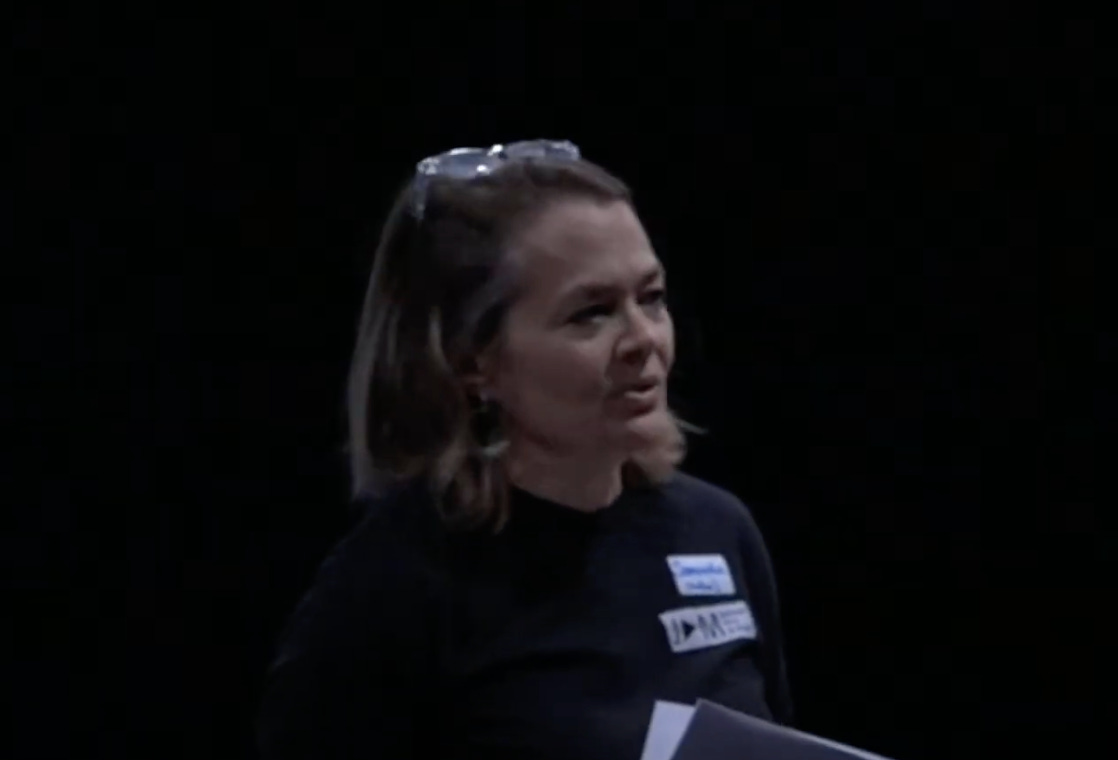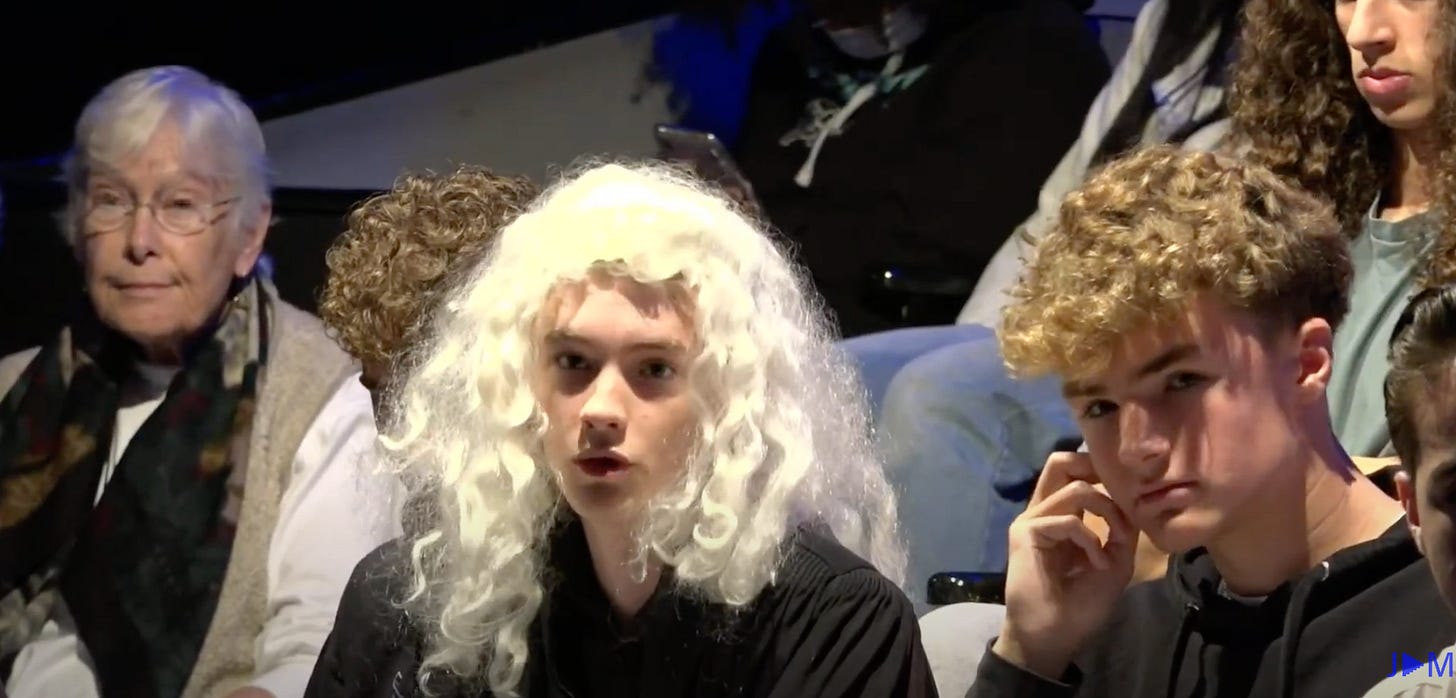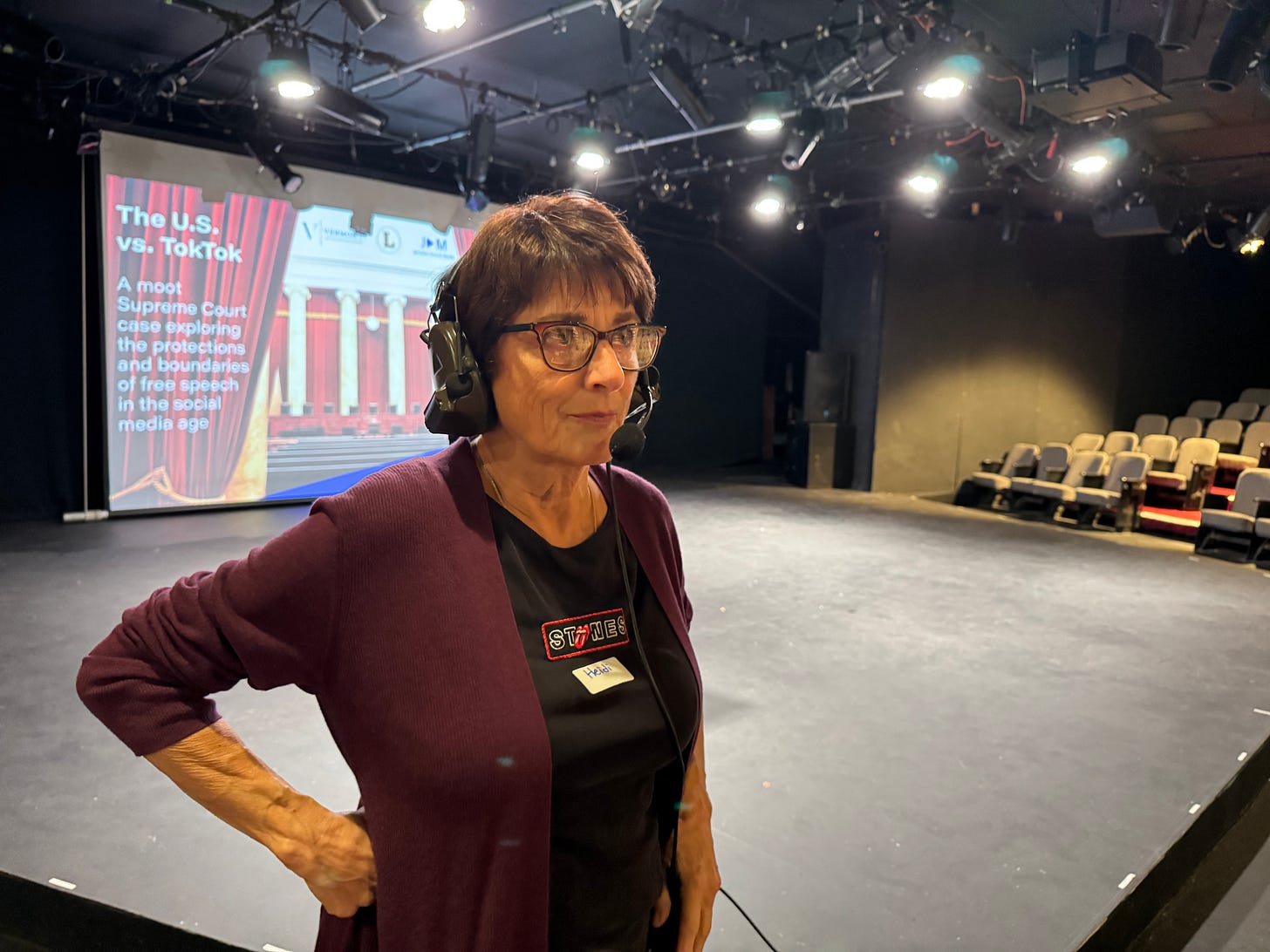A U.S. Supreme Court Spars with TikTok (in Vermont!)
VT Law & Grad School President Rod Smolla Holds Court in White River Junction

November 10, 2024
White River Junction, VT — You had to have been there, along with the imagined likenesses of Harry Potter and Oliver Wendell Holmes, along with the very real fifty or so Lebanon High School students and community members this past Friday in White River Junction at the Briggs Opera House on Friday, November 8th at 9:30 am. You’d have been witness to a U.S. Supreme Court moment in which the hypothetical case of the United States versus Tik Tok, Inc. was presented, argued, discussed, and decided. All within the space of an hour.
The morning started with introductory comments from Samantha Davidson Green, executive director of Junction Arts & Media (JAM), the host and collaborating partner in this civic engagement and legal learning program. It’s part of JAM’s “Mediated Lives” series which aims to explore the role of our current media landscape in shaping American culture, free speech, creativity, community, and democracy. (Click Here for the full video of this moot court TikTok presentation.)

It continued with Vermont Law and Graduate School’s president, Rod Smolla, presenting the case with the help of a specially-imagined Harry Potter-like transformational potion to deputize the Lebanon High School students as U.S. Supreme Court justices. An oral argument in moot court style ensued.
This was a hypothetical case of TikTok, Inc. vs. the United States in which TikTok and it’s Chinese-owned parent company, ByteDance, have filed a federal lawsuit challenging the 2024 Congressional “Protecting Americans from Foreign Adversary Controlled Application Act,” often popularly referred to as the “TikTok Ban.” At issue are claims by TikTok and ByteDance, joined by several American creators, persons who post creative content on TikTok, that the Act violates their First Amendment guarantee of freedom of speech. The actual TikTok case is real, and although this moot court exercise was hypothetical, its relevance to what we perceive as free speech rights at play in the social media realm is very real. As you might imagine, the high school students were highly engaged. This, after all, is their social media playground at stake.
Smolla created this exercise, modeling it after the current Tik Tok case that’s now winding its way through the appeals court process and which may soon reach the U.S. Supreme Court. Beyond the First Amendment rights issue of freedom of speech and what is protected speech, this case also deals with foreign entities doing business in the United States, China as an adversary nation, data security, covert data manipulation, ownership and divestiture of an American company by a foreign corporate entity, all within the context of social media and its impact upon and use by Americans, including children. The high school students received a detailed Moot Court Exercise briefing designed by Smolla in advance.
To begin with some levity, President Smolla exposed an imaginary potion similar to one from Harry Potter. He then cast a spell on the Lebanon High School students and other community members in the audience to transform them into justices of the U.S. Supreme Court. This deputized and empowered them to actively question Smolla who then took on the roles first of the U.S. Solicitor General and, next, as the attorney representing Tik Tok to argue both sides of this case. His recall and mastery of the subject matter of prior Supreme Court cases to use them as precedent was a pleasure to watch. His ability to engage high school students in the complexities of the many issues at play was also masterful. And, certainly, their high school teacher, Greg Stoloski, had coached his students well with Smolla’s detailed exercise as their classroom guide to prepare for this moment.

What’s at stake? Well, of course, freedom of speech was the hot topic, but so, it seemed to me, was the notion of civil discourse on a contentious and timely issue that could easily have divided the court and its more than fifty duly-anointed justices. Lebanon High School students rose to the challenge, peppering Smolla with well-developed questions throughout his oral argument, then presented to one another their own rationale for and against banning TikTok as a Chinese-owned, U.S.-based company. The ultimate decision was deemed 6-3 in favor of allowing TikTok to continue to operate as a U.S. company. Whether this is indicative of how the U.S. Supreme Court might rule should it ever hear oral arguments in the TikTok case will be the kind of crystal ball moment Lebanon High School students can watch carefully over the coming weeks and months. It’s an educator’s dream to see students engage so readily.
However, more to the point, and to highlight the benefits of this three-way collaboration between Vermont Law and Graduate School, Junction Arts & Media, and Lebanon High School is the kind of community-building moment I hail as a success for civil discourse and the development of civil society through education and community-based partnerships. The students were energized and eager to share their perspectives and participate in the oral arguments and discussion that followed. They also asked Smolla questions about his background, his trajectory as a lawyer and into academia, and what they should pursue in college should they want to apply to law school as a next step. In their eagerness to learn and joust with one another, I felt hope for our nation among its youngest members.
President Smolla, with the potion and its spell now having worn off, moved back into reality to answer the students’ questions. He suggested that they need not follow any particular course of study in college to get into and succeed at law school. But, he stressed they learn some U.S. history, study Shakespeare, and read broadly so they can understand the underpinnings of the web of U.S. case and statutory law that form the basis of our legal system. As for me, I suggest some courses in English literature, psychology, and philosophy to bolster an understanding not just of our legal system but also of what makes people tick. After all, clients are real people, with very human emotions, feelings, and failings. To represent them effectively, a lawyer must certainly understand the law as well as those myriad human conditions that impact people as they seek justice.

Ultimately, as a lesson in civil society, JAM’s effort to foster a more informed media community may have much further-reaching implications should this model be seen as one that can educate and provide a platform for communities to come together and govern themselves effectively. Having a local law school and its president as eager and ready to participate as is Vermont Law and Graduate School might just be the special sauce that provides a Harry Potter-esque elixir to make this type of community-building a reality.
Greg Stoloski teaches Social Studies at Lebanon High School. This is the second year his class has participated in a moot court argument with President Smolla and recorded by JAM. Last year’s argument took place in the VLGS courtroom on its campus in South Royalton, VT.
Samantha Davidson Green is executive director of Junction Arts & Media (JAM) in White River Junction, Vermont. Following the moot court case she and JAM staff members took the Lebanon High School students on a tour of White River Junction to show them JAM’s production and broadcasting facilities.
Rodney Smolla is president of Vermont Law and Graduate School in South Royalton, Vermont. This is the second consecutive year he has collaborated with Lebanon High School and Junction Arts & Media to present a moot court argument with First Amendment and other constitutional law issues at play. He speaks often to community groups locally, regionally, and nationally. Smolla remains an active litigator and is well-known for his representation of American and international clients on matters relating to defamation and invasion of privacy. He represented Dominion Voting Systems in its defamation case against Fox News Systems arguing for Dominion on First Amendment grounds. Fox settled the lawsuit for $787 million.
Dave Celone is vice president for Alumni Relations and Development at Vermont Law and Graduate School of which he is an alumnus. He writes from Sharon, VT.
The 3-camera media livestream and live cable broadcast were produced by participants of JAM’s Digital Media Creation for Seniors, a partnership piloted with Bugbee Senior Center and supported by AARP, who were partnered with JAM High School Media Fellows. JAM has committed to intergenerational media education as core to its mission and a pillar of its strategic plan to innovate new ways to use media tools to strengthen the social fabric and civic engagement in the Upper Valley. More links and photos of the JAM production team follow.

Photos of the JAM production crew as shared by JAM appear below.








